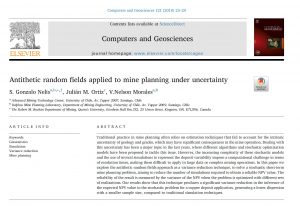 This paper was recently published in Computers & Geosciences.
This paper was recently published in Computers & Geosciences.
Click here to download.
Antithetic random fields applied to mine planning under uncertainty
Gonzalo Nelis (Advanced Mining Technology Center, University of Chile, Av. Tupper 2007, Santiago, Chile / Delphos Mine Planning Laboratory, Department of Mining Engineering, University of Chile, Av. Tupper 2069, Santiago, Chile), Julián M. Ortiz (The Robert M. Buchan Department of Mining, Queen’s University, Goodwin Hall Rm.332, 25 Union Street, Kingston, ON, K7L3N6, Canada), Nelson Morales (Advanced Mining Technology Center, University of Chile, Av. Tupper 2007, Santiago, Chile / Delphos Mine Planning Laboratory, Department of Mining Engineering, University of Chile, Av. Tupper 2069, Santiago, Chile)
Abstract
Traditional practice in mine planning often relies on estimation techniques that fail to account for the intrinsic uncertainty of geology and grades, which may have significant consequences in the mine operation. Dealing with this uncertainty has been a major topic in the last years, where different algorithms and stochastic optimization models have been proposed to tackle this issue. However, the increasing complexity of these stochastic models and the use of several simulations to represent the deposit variability impose a computational challenge in terms of resolution times, making them difficult to apply in large data or complex mining operations. In this paper we explore the antithetic random fields approach as a variance reduction technique, to solve a stochastic short-term mine planning problem, aiming to reduce the number of simulations required to obtain a reliable NPV value. The reliability of the result is measured by the variance of the NPV when the problem is optimized with different sets of realizations. Our results show that this technique produces a significant variance reduction in the inference of the expected NPV value in the stochastic problem for a copper deposit application, generating a lower dispersion with a smaller sample size, compared to traditional simulation techniques.
